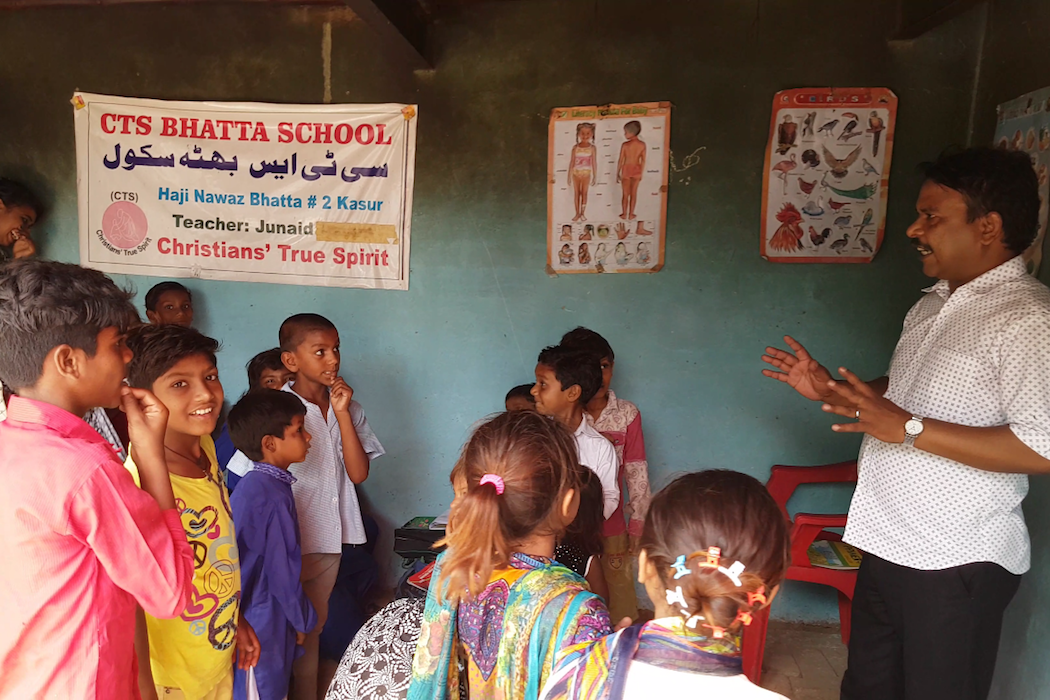Bonded labor in slave-like conditions continues to plague the country despite a prohibition

Christian True Spirit Bhatta (brick kiln) school at National Bricks 2, a brick kiln in Kasur district Punjab Province. (Photo by Kamran Chaudhry/ucanews.com)
June 15, 2018
Neha Rehmat and her siblings make more than 3,000 bricks every day before going to school.
“I dump the clay in front of them and they pack it into rectangular molds,” the 13-year-old Pakistani told ucanews.
“Pushing the loaded wheelbarrows becomes tougher in hot summers.”
The number of bricks produced declines if one of them becomes ill, resulting in less pay.
The seven siblings have been making bricks since their father died of cancer in 2015. The family borrowed 300,000 rupees (US$2,600) for his treatment from the kiln owner.
Luckily for them, a welfare organization last year paid off their loan.
“We do not let our elderly mother work,” Neha said, adding that exhaustion could make it difficult to concentrate on school work.
They live with others in a collection of mud houses at a brick kiln in Kasur district, 49 kilometers from Lahore, the capital of Pakistan’s Punjab Province.

Neha Rehmat cooks for her family in her mud house that is a part of a colony supporting National Bricks 2, a brick kiln in Kasur district, Punjab Province. (Photo by Kamran Chaudhry/ucanews.com)
Young people such Neha wake up at the crack of dawn every morning to do household chores before heading to the brick factory, National Bricks 2, where they earn only 920 rupees (US$7.96) for making 1,000 bricks.
Nonetheless, there are dish antennas on the humble dwellings.
Watching television, especially gospel channels or music, was previously the main activity of an evening.
“Now the revision of books and homework is part of our routine,” said Neha, referring to a school opened in their factory settlement last July by a group called Christian True Spirit (CTS).
Helping Hands
Thirty-five children, aged three to 18, now attend three-hour basic education classes.
The small classroom turns into a church every Sunday when a visiting pastor conducts a prayer service for the laboring community.
CTS is running two such schools in the Kasur district.
Founded in 2015, the organization works for women’s empowerment, provides legal assistance to female victims of violence, shelters people subjected to forced religious conversions and supports prisoners.
“Brick makers are isolated communities,” said Katherine Sapna, the CTS director.
“Most industrial kilns are located far from schools.”
Obtaining approval for the opening of schools from kiln owners has been a big challenge.
Most of them deny the existence of residential colonies of laborers who are usually trapped after getting a peshgi, which is a loan or advance.
Generations remained in bondage as their debt grew over time, Sapna said.

Class is held at Christian True Spirit Bhatta (brick kiln) school at National Bricks 2 brick kiln. (Photo by Kamran Chaudhry/ucanews.com)
Church survey
The Justice and Peace Commission, of the Major Religious Superiors Leadership Conference JPC–MSLCP, further highlighted their challenges through recent research on socio-economic conditions of brick kiln workers.
These laborers could be considered as ‘slaves’ of the modern world, a report on the research states.
They were born and died at the kilns.
And laborers could be sold to another kiln owner if an employer felt that they were not needed because of old age, sickness or were viewed as causing problems, the report states.
According to the JPC–MSLCP survey, 64.6 respondents at 438 brick kilns in the Multan area of southern Punjab did not reply to questions on the peshgi system.
More than 63 percent did not pay taxes of any kind and 98.6 percent failed to provide educational opportunities.
The Supreme Court of Pakistan in 1988 declared bonded labor to be illegal, but it is still practiced throughout the country.
The nation’s constitution also bans any kind of slavery or child labor. The penalty for keeping bonded labor is imprisonment of two to five years or a fine of 50,000 rupees (US$433) or both.
Hyacinth Peter, executive secretary of JPC–MSLCP, notes that Pakistan has ratified both the International Labor Organization (ILO) Forced Labor Convention No. 29 (1930) and the Abolition of Forced Labor Convention No. 105 (1957).
“Still the practice of bonded labor or debt bondage continues to flourish with impunity in agriculture in Sindh and brick kilns in the Punjab and Khyber Pakhtunkhwa provinces,” he said.
“The brick kiln owners have close links with the bureaucracy and politicians.
“All the laws have not been able to stop them from violating laborers’ rights.”
He called on the government to set-up committees to monitor brick making factories and document abuses.
There are presently 2.2 million brick kiln workers in Punjab province, according to the JPC–MSLCP, about 40 percent of them Christians.
In 2014, a Christian couple working as laborers at a brick kiln, in Kot Radha Kishan town of Kasur district, were locked up, beaten and then thrown on top of a lit furnace by a mob of about 1,000 people incited by accusations that they had desecrated the Quran.
Last month, a woman brick-kiln worker named Nasreen Bibi was allegedly killed by a kiln owner in Pakpattan district.
According to police, when Bibi demanded her wages the kiln owner allegedly tortured her then shut her in a room where she died.
Last year, the government of Punjab lodged police reports against 897 brick kiln owners who forced children into labor.
The Human Rights Commission of Pakistan in its 2017 annual report recommended dissemination of accurate data on impoverishment, particularly the feminization of poverty.
The report identified a need to revise the definition of labor force participation rates for women to include so-called non-formal categories such as agricultural, home-based and brick kiln work.
